Daily Vocabulary Words: Enhance Your Lexicon with Leading Newspapers & Publications
Welcome to the Daily Vocabulary section at Wordpandit!
Our mission is straightforward: to bring you essential vocabulary words featured in top newspapers and publications worldwide. By focusing on words you’ll encounter in renowned sources, we aim to help you enhance your vocabulary effectively and practically.
Our selection includes words from:
– The New York Times
– The Washington Post
– Scientific American
– BBC
– The Guardian
– Psychology Today
– Wall Street Journal
– The Economist
– The Hindu
– The Times of India
– The Economic Times
– Hindustan Times
– Live Mint
– The Indian Express
– And many more.
We are committed to your vocabulary development. Simply visit this section regularly and explore the daily posts. This is your go-to repository for commonly used words, providing significant practical benefits by familiarizing you with vocabulary from the leading publications listed above.
Make it a habit to visit our website daily and expand your lexicon with words from top newspapers and publications.
WORD-1: Unambiguous
CONTEXT: The outcome of the 18th general election is an unambiguous reiteration by the people of that tenet. As the verdict unfolded on June 4, the Bharatiya Janata Party (BJP) fell short of an absolute majority in the Lok Sabha, which is a far cry from its claims made during the campaign.
SOURCE: Unknown
EXPLANATORY PARAGRAPH: Imagine you draw a picture of the sun and it’s big, round, and yellow. Everyone can tell it’s the sun because it’s really clear. That’s what “unambiguous” means—it’s when something is so clear and easy to understand that no one gets confused.
MEANING: Clear and precise; having only one possible meaning or interpretation (adjective).
PRONUNCIATION: un-am-BIG-you-us
SYNONYMS: clear, obvious, explicit, definite, straightforward
USAGE EXAMPLES:
1. The teacher gave unambiguous instructions for the assignment.
2. It was an unambiguous yes to his proposal.
3. The signs on the road should be unambiguous to prevent accidents.
4. Her reply was unambiguous, leaving no room for doubt.
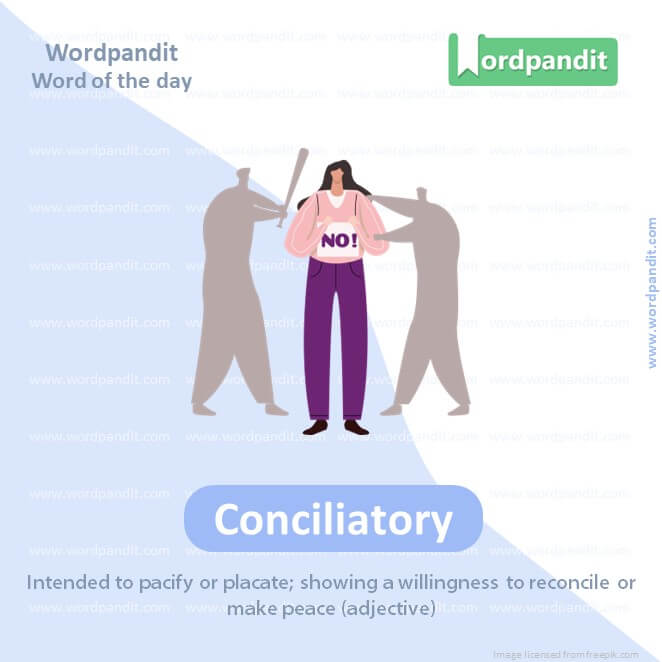
WORD-2: Conciliatory
CONTEXT: The verdict of the people cannot be clearer than this — it wants the BJP to be more conciliatory and less confrontational towards the political aspirations of various communities and regions of India.
SOURCE: The Hindu
EXPLANATORY PARAGRAPH: Imagine you and your friend had a little argument about which game to play, and you decide to let them choose this time to make things better. That’s being “conciliatory.” It means trying to make peace or fix a problem by being nice and understanding.
MEANING: Intended to pacify or placate; showing a willingness to reconcile or make peace (adjective).
PRONUNCIATION: kuhn-SIL-ee-uh-tor-ee
SYNONYMS: peacemaking, soothing, appeasing, mollifying, placating
USAGE EXAMPLES:
1. His tone was conciliatory, hoping to calm the upset customer.
2. She made a conciliatory gesture by inviting her estranged brother to the party.
3. The mediator’s conciliatory approach helped resolve the conflict.
4. A conciliatory message was sent to the opposing team after the tense game.
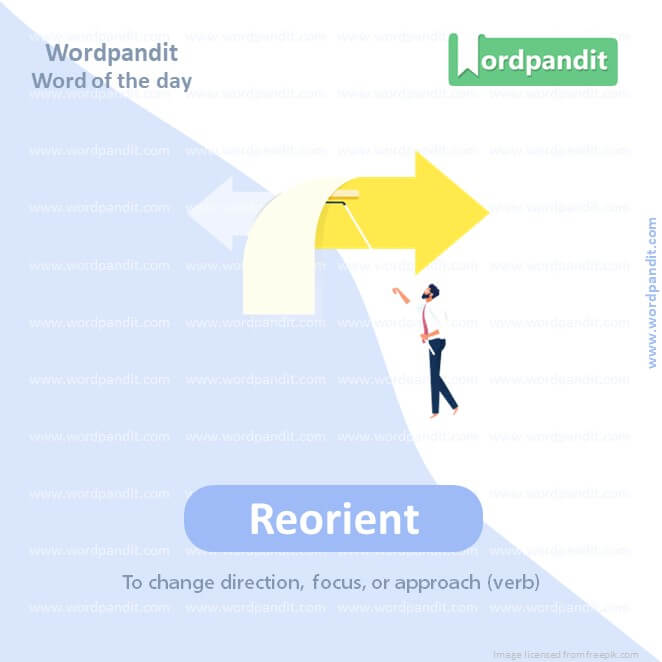
WORD-3: Reorient
CONTEXT: The BJP must heed that message in a democratic spirit, and reorient itself to the reality of the reemergence of coalition politics after 10 years.
SOURCE: The Hindu
EXPLANATORY PARAGRAPH: Imagine you’re walking to school, but you take a wrong turn. Then, you figure out the right way and start walking in the correct direction. That’s “reorient.” It means changing direction or thinking to go the right way or think the right thing.
MEANING: To change direction, focus, or approach (verb).
PRONUNCIATION: ree-OHR-ee-ent
SYNONYMS: redirect, readjust, realign, recalibrate, refocus
USAGE EXAMPLES:
1. He had to reorient his studies towards a more promising field.
2. After getting lost, they stopped to reorient themselves using the map.
3. The company reoriented its marketing strategy to appeal to younger consumers.
4. It was necessary to reorient the telescope to capture the meteor shower.
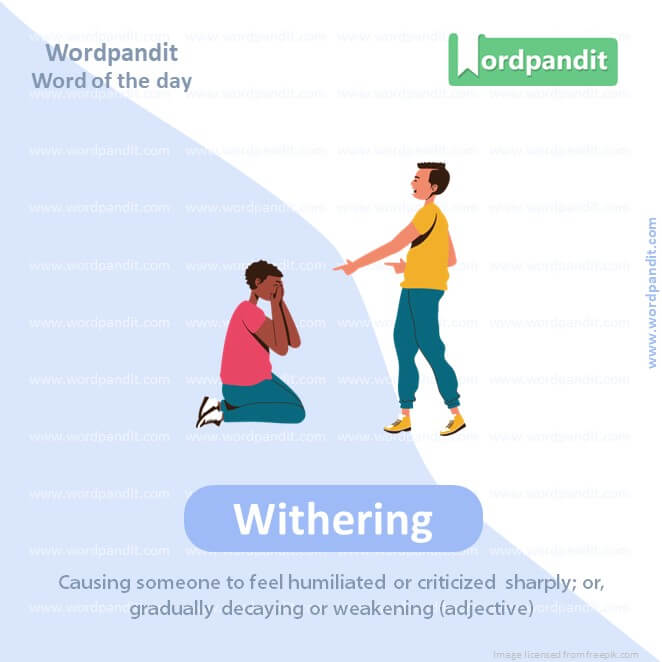
WORD-4: Withering
CONTEXT: The overwhelming charisma and style of Mr. Modi served the party well in 2014 and 2019, but the same factors were corroding the party’s organisational strengths and withering its regional and local leadership.
SOURCE: The Hindu
EXPLANATORY PARAGRAPH: Imagine a plant that doesn’t get enough water and starts to droop and look really sad. That plant is “withering.” It’s when something shrinks, fades, or becomes less strong because it’s not being taken care of properly.
MEANING: Causing someone to feel humiliated or criticized sharply; or, gradually decaying or weakening (adjective).
PRONUNCIATION: WITHER-ing
SYNONYMS: devastating, scathing, shrinking, declining, deteriorating
USAGE EXAMPLES:
1. The teacher’s withering glance was enough to stop the noise.
2. She delivered a withering critique of his work.
3. The drought had a withering effect on the crops.
4. His withering sarcasm made the meeting uncomfortable.
WORD-5: Mongering
CONTEXT: The outcome of 2024 should also put to rest the unnecessary fear mongering about EVMs, though serious and urgent steps are required to reinforce public trust in the electoral process.
SOURCE: The Hindu
EXPLANATORY PARAGRAPH: Imagine someone who keeps spreading scary stories about monsters, making everyone feel frightened. That’s a bit like “mongering.” It means spreading something widely, usually something bad like fear or rumors.
MEANING: Promoting or peddling something negative (verb).
PRONUNCIATION: MONG-er-ing
SYNONYMS: spreading, promoting, peddling, stirring up, inciting
USAGE EXAMPLES:
1. He was accused of fear-mongering with his alarming statements.
2. The article accused the media of rumor-mongering.
3. She disliked the mongering of gossip in the office.
4. War-mongering statements escalated the tensions.
WORD-6: Miraculously
CONTEXT: This balance was made possible in part by an INDIA alliance, especially in UP, that miraculously held together.
SOURCE: Indian Express
EXPLANATORY PARAGRAPH: Imagine if you dropped your ice cream on the ground, but it landed on the cone and didn’t get dirty at all. That’s like something “miraculously” happening. It means something amazing or surprising happens, just when it seemed impossible.
MEANING: In a way that is very surprising or difficult to believe (adverb).
PRONUNCIATION: mi-RAK-yuh-lus-lee
SYNONYMS: astonishingly, amazingly, wondrously, extraordinarily, incredibly
USAGE EXAMPLES:
1. Miraculously, he survived the fall with only a few scratches.
2. The team miraculously won the game in the last second.
3. She miraculously found her lost ring in the sand.
4. The documents were miraculously recovered after the fire.
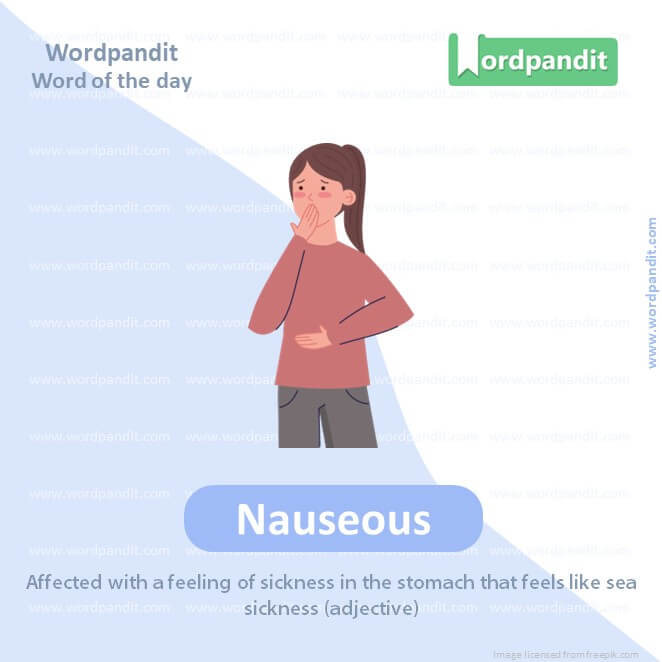
WORD-7: Nauseous
CONTEXT: The air of despondency, the suffocating shadow of authoritarianism, and the nauseous winds of communalism have, at least for the moment, lifted.
SOURCE: Indian Express
EXPLANATORY PARAGRAPH: Imagine eating too much candy and then feeling like your stomach is all weird and you might throw up. That feeling is called being “nauseous.” It’s when you feel sick, especially like you want to vomit.
MEANING: Affected with a feeling of sickness in the stomach that feels like sea sickness (adjective).
PRONUNCIATION: NAW-shus
SYNONYMS: queasy, sick, unwell, bilious, upset
USAGE EXAMPLES:
1. The long bus ride made him feel nauseous.
2. The strong smells from the kitchen were making her nauseous.
3. He looked pale and nauseous after the ride.
4. Eating too quickly can make you feel nauseous.
WORD-8: Omnipotence
CONTEXT: He made this election about himself: His performance, his omnipotence and omniscience, and his ideological obsessions.
SOURCE: Indian Express
EXPLANATORY PARAGRAPH: Imagine if you had a magic wand that could do anything—like make candy rain from the sky or turn a toy into a real animal. If you could do anything like that, you’d have “omnipotence.” It means having unlimited power or being able to do anything.
MEANING: Unlimited power; able to do anything (noun).
PRONUNCIATION: om-NIP-uh-tens
SYNONYMS: all-powerfulness, supremacy, invincibility, godliness, absolute power
USAGE EXAMPLES:
1. The king believed in his own omnipotence, ruling without question.
2. The story explored the theme of the dangers of omnipotence.
3. She felt a sense of omnipotence when she mastered the new software.
4. The omnipotence of nature is often awe-inspiring.
WORD-9: Indomitable
CONTEXT: Modi is, for the moment, not the indomitable vehicle for History, or the deified personification of the people. Today, he is just another politician, cut to size by the people.
SOURCE: Indian Express
EXPLANATORY PARAGRAPH: Imagine your favorite superhero who never gives up, no matter how tough the fight is. That superhero is “indomitable.” It means being really strong in spirit and never letting anything defeat you.
MEANING: Impossible to subdue or defeat; very brave or determined (adjective).
PRONUNCIATION: in-DOM-it-uh-bul
SYNONYMS: unbeatable, unyielding, invincible, resilient, steadfast
USAGE EXAMPLES:
1. Her indomitable spirit helped her overcome many challenges.
2. Despite the setbacks, he remained indomitable.
3. The team’s indomitable will brought them to the finals.
4. He admired her indomitable courage in facing her illness.
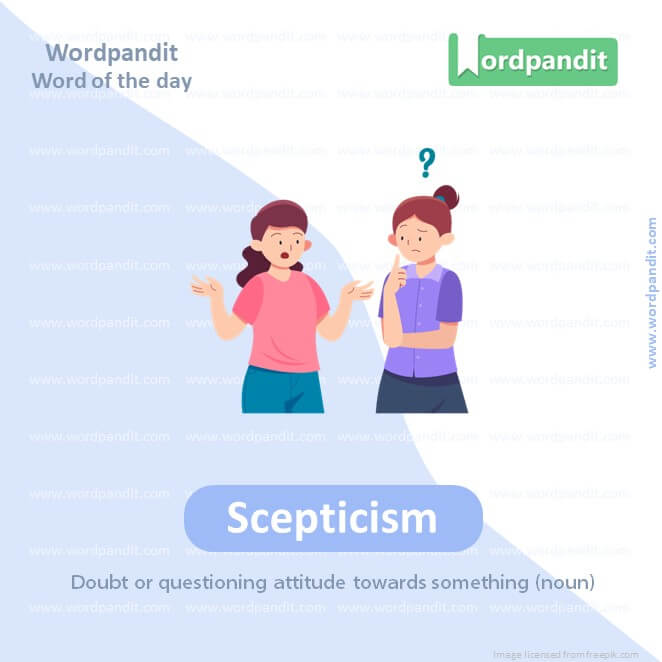
WORD-10: Scepticism
CONTEXT: It has to be said, this is a tribute to the dogged persistence of the Opposition that has battled the full might of being targeted by the government, a hostile media, and deep scepticism going into the election.
SOURCE: Indian Express
EXPLANATORY PARAGRAPH: Imagine you hear a story about a flying pig, and you think, “That can’t be true!” That feeling of doubting or not believing something right away is called “scepticism.”
MEANING: Doubt or questioning attitude towards something (noun).
PRONUNCIATION: SKEP-ti-sizm
SYNONYMS: doubt, disbelief, uncertainty, wariness, mistrust
USAGE EXAMPLES:
1. His claim was met with scepticism by the audience.
2. She expressed her scepticism about the effectiveness of the new policy.
3. There is healthy scepticism in the scientific community.
4. The old legend is often viewed with scepticism today.
Vocabulary Words
When delving into the dynamic world of languages, the grandeur of ‘vocabulary words’ is all-encompassing. The importance of ‘vocabulary words’ in effective communication cannot be overstated; it’s these words that form the backdrop of any language, painting intricate pictures of thoughts and ideas.
Starting on the journey of learning ‘vocabulary words’, one should steer clear from rote memorization. The traditional structure of merely repeating words lacks the necessary context and application that actually embeds these words into your memory. To truly master the ‘vocabulary words’, one needs an integrated, immersive approach.
The first step towards mastering ‘vocabulary words’ is to engage with varied language mediums. Expanding beyond textbooks to read fiction, articles, blogs, and other forms of content not only diversifies your vocabulary but also acts as a mirror to reflect the practical application of these words. Essentially, you’re exposed to the words as they are commonly used, allowing you to truly understand their essence.
Empowering this journey, tech tools like language learning apps and memory-enhancing flashcards significantly aid in learning ‘vocabulary words’. These interactive tools provide a more engaging learning experience and hone word retention. Mnemonic devices, associating words with a unique story or visual image, enrich the process and make memory recall more efficient.
Practicing ‘vocabulary words’ by using them in day-to-day conversations exemplifies learning by doing. It also strengthens the neural pathways and improves overall word recall. This, coupled with regular revisions, ensures your grasp over ‘vocabulary words’ remains strong.
In conclusion, learning ‘vocabulary words’ is not just about adding words to your linguistic cupboard, but understanding their essence and utilizing them effectively. An inclusive approach to learning that combines diverse reading materials, technology tools, mnemonic devices and practice can really propel your mastery over ‘vocabulary words’. Remember, language is the bloodline of communication, and ‘vocabulary words’ are its heartbeat. ‘







